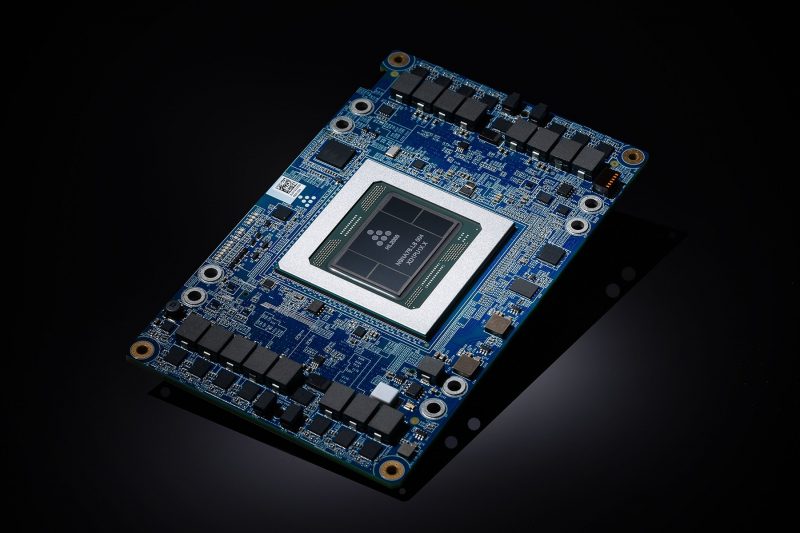
Intel Corp.’s Habana Labs unit today said that it will provide hundreds of artificial intelligence chips to the University of California at San Diego, which will incorporate them into an upcoming research supercomputer called Voyager.
Voyager will be used by scientists for projects such as analyzing data from particle accelerator experiments.
Intel acquired Habana Labs for $2 billion in 2019, a mere two years after the startup had exited stealth mode. Habana Labs offers a pair of AI chips, called Gaudi and Goya, for training machine learning models and performing inference, respectively.
Habana claims its silicon can run AI workloads more cost effectively than graphics processing units in some cases thanks to a number of efficiency-boosting capabilities built into the architecture. The main highlight is a set of 10 100-gigabit Ethernet ports included in each chip.
Because training and running AI software is computationally intensive, organizations typically split the work among a large number of processors. Those processors, in turn, must be connected with one another to coordinate calculations, which is accomplished using devices known as network interface cards. There usually needs to be one device per chip, a requirement that can significantly increase the cost of building large machine learning systems such as AI-optimized supercomputers.
The 10 Ethernet ports built into each Habana Labs chip remove the need for a standalone network interface card. According to the Intel unit, this approach not only cuts system costs by reducing hardware requirements but also improves performance. Amazon Web Services Inc., which plans to launch an instance series based on Habana Labs’ Gaudi AI training chips, has said that users can expect up to 40% higher price-performance compared with GPU instances.
UC San Diego’s Voyager supercomputer will feature 336 Gaudi chips and 16 inference-optimized Goya chips. The supercomputer will enable researchers to develop custom AI models, as well as new machine learning techniques, for use in computational science experiments.
As part of the project, Super Micro Computer Inc., UC San Diego’s technology partner, will incorporate the chips from Habana Labs into two sets of computing modules. Those systems will form the basic building blocks of Voyager. The first set of modules will each feature eight Gaudi chips and two third-generation Intel Xeon Scalable central processing units, while the second set will pair eight Goya inference chips with second-generation Xeon Scalable parts.
Voyager is set to come online this fall. From there, a three-year “testbed phase” will follow during which the supercomputer will be used by a select number of research teams from fields including astronomy, climate sciences, chemistry and particle physics, among others. The participating teams will explore ways of harnessing the supercomputer’s AI chips and develop technical documentation that will be shared with other scientists as UC San Diego expands access to Voyager over time.
Chetan Kapoor, a senior manager for EC2 product management at AWS, and Habana Labs Chief Business Officer Eitan Medina appeared on SiliconANGLE Media’s theCUBE in December to discuss the Intel unit’s technology:
Photo: Habana Labs
Since you’re here …
Show your support for our mission with our one-click subscription to our YouTube channel (below). The more subscribers we have, the more YouTube will suggest relevant enterprise and emerging technology content to you. Thanks!
Support our mission: >>>>>> SUBSCRIBE NOW >>>>>> to our YouTube channel.
… We’d also like to tell you about our mission and how you can help us fulfill it. SiliconANGLE Media Inc.’s business model is based on the intrinsic value of the content, not advertising. Unlike many online publications, we don’t have a paywall or run banner advertising, because we want to keep our journalism open, without influence or the need to chase traffic.The journalism, reporting and commentary on SiliconANGLE — along with live, unscripted video from our Silicon Valley studio and globe-trotting video teams at theCUBE — take a lot of hard work, time and money. Keeping the quality high requires the support of sponsors who are aligned with our vision of ad-free journalism content.
If you like the reporting, video interviews and other ad-free content here, please take a moment to check out a sample of the video content supported by our sponsors, tweet your support, and keep coming back to SiliconANGLE.
"chips" - Google News
April 08, 2021 at 07:00PM
https://ift.tt/3t60G9q
Intel's Habana Labs to supply AI chips for new UC San Diego research supercomputer - SiliconANGLE News
"chips" - Google News
https://ift.tt/2RGyUAH
https://ift.tt/3feFffJ
Bagikan Berita Ini















0 Response to "Intel's Habana Labs to supply AI chips for new UC San Diego research supercomputer - SiliconANGLE News"
Post a Comment